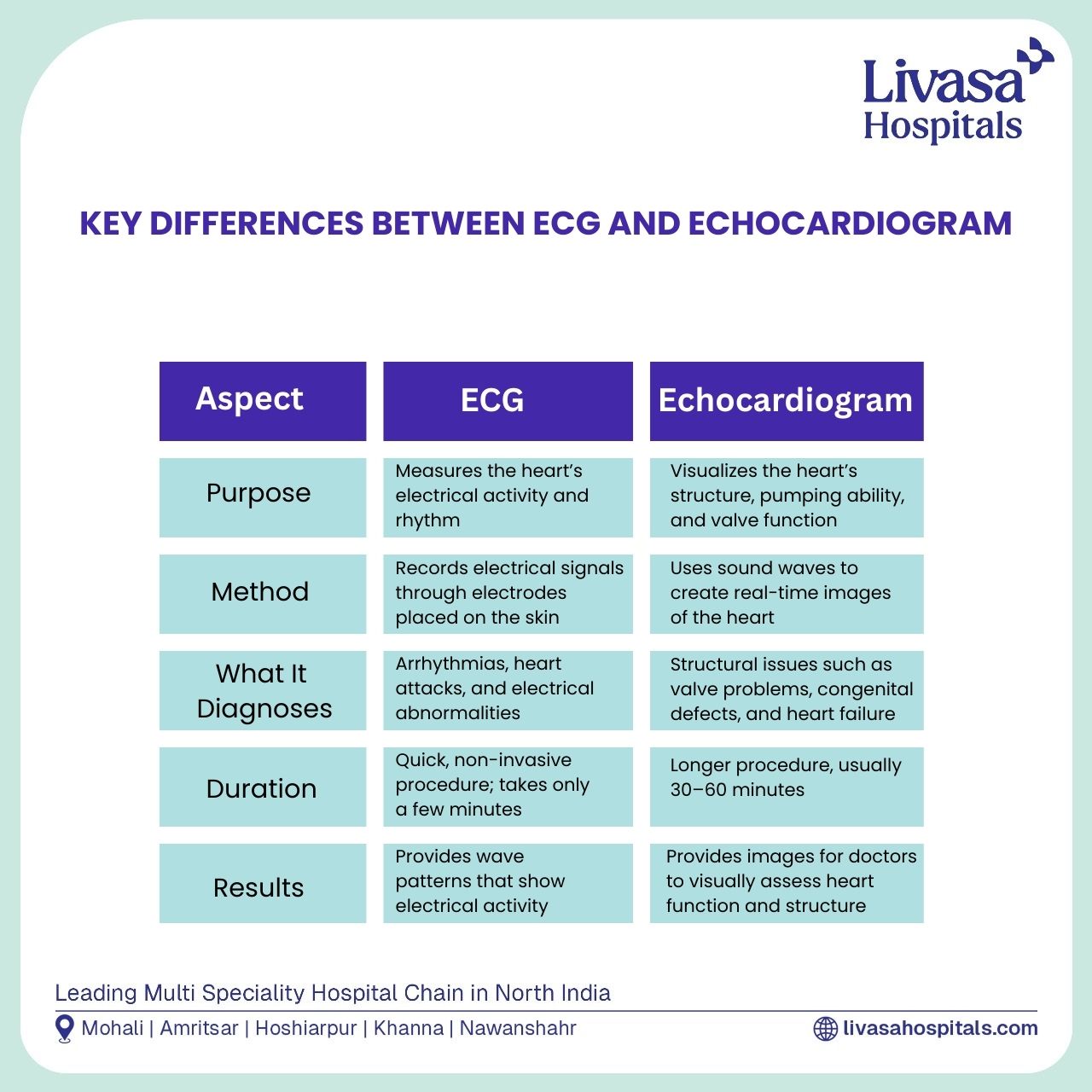19 Dec 2025
Age Specific Related to Psoriasis in Amritsar


Dr. Anil Sharma
04 Feb 2025
Call +91 80788 80788 to request an appointment.
Echocardiograms and electrocardiograms (ECGs or EKGs) are both diagnostic tools used to assess heart health, but they function in very different ways and provide distinct types of information about the heart. Understanding these differences is important for patients and healthcare providers alike, as they help guide decisions regarding heart disease diagnosis and treatment.
What is an Electrocardiogram (ECG)?
An electrocardiogram (ECG) is a test that records the electrical activity of the heart over a period of time. It is a non-invasive and quick procedure that uses electrodes placed on the skin to detect the electrical signals produced by the heart as it beats. These signals are recorded on graph paper or digitally displayed, showing the timing of electrical impulses that trigger each heartbeat.
An ECG measures the frequency, rhythm, and strength of the hearts electrical activity. It can detect arrhythmias (irregular heartbeats), heart attacks, and other heart conditions related to electrical function. For example, an ECG can help diagnose conditions like atrial fibrillation, heart block, and myocardial infarctions (heart attacks), or indicate electrolyte imbalances that may affect heart function.
Procedure: The ECG procedure involves placing small adhesive electrodes on the chest, arms, and legs to record the hearts electrical signals. It is quick, usually taking only a few minutes, and is non-invasive.
Use of ECG: ECGs are typically used for:
What is an Echocardiogram?
An echocardiogram, on the other hand, is a type of ultrasound that uses high-frequency sound waves to create detailed images of the heart's structure and function. This test is often referred to as a "heart ultrasound" because it provides a visual representation of the heart's chambers, valves, walls, and blood vessels. The sound waves bounce off the heart and are converted into images, allowing doctors to evaluate how well the heart is pumping and if any abnormalities are present.
An echocardiogram is crucial for diagnosing structural heart problems, including heart valve diseases, heart failure, congenital heart defects, and pericardial disease (inflammation of the lining around the heart). It can also provide information on the heart's pumping efficiency, which is critical for diagnosing and managing heart failure.
Procedure: During an echocardiogram, a gel is applied to the chest, and a device called a transducer is moved over the skin to produce the sound waves. The procedure may take 30-60 minutes depending on the complexity of the images required.
Use of Echocardiogram: Echocardiograms are typically used for:
Key Differences Between ECG and Echocardiogram
While both tests are essential for heart health, they serve very different purposes and provide unique insights into the heart's condition:

Which Test is Right for You?
The choice between an ECG and an echocardiogram depends on the symptoms you are experiencing and what your healthcare provider is trying to diagnose. If you have a history of heart disease, chest pain, or an irregular heartbeat, your doctor may order an ECG to evaluate your hearts electrical activity. On the other hand, if you have symptoms like shortness of breath, swelling, or chest discomfort, an echocardiogram may be used to evaluate the physical condition of your hearts structures and how well it is pumping blood.
In many cases, both tests may be used together to provide a complete picture of your hearts health. While an ECG gives insights into the electrical signals that control heartbeats, an echocardiogram provides information about how the heart is functioning physically.
Conclusion
Both the electrocardiogram and echocardiogram are essential diagnostic tools in cardiology. By understanding the differences between these two tests, patients and healthcare providers can better navigate the path to accurate diagnosis and effective treatment of heart conditions. Whether monitoring electrical activity with an ECG or evaluating heart structure with an echocardiogram, these tests play a vital role in heart health and disease management.
+91 80788 80788
Livasa Healthcare Group Corporate Office,Phase-8, Industrial Area, Sector 73, Sahibzada Ajit Singh Nagar, Punjab 160071
livasacare@livasahospitals.in
| Mohali | +91-99888 23456 |
| Amritsar | +91-99887 49494 |
| Hoshiarpur | +91-99883 35353 |
| Nawanshahr | +91-75081 82337 |
| Khanna | +91-98888 05394 |